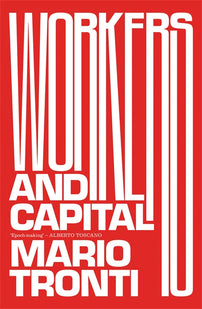Mario Tronti Doesn’t Belong to the Hoity-Toity
When we talk about operaismo, we don’t think of university chairs and conferences. We think of struggles, conflicts, the desire for freedom, the refusal to bow our heads. Today even more than yesterday.

On 7 August, Mario Tronti died. The many obituaries, memories, and testimonies called him “a giant,” indeed the “father of operaismo” — which is all well and good. But to us, when we talk about operaismo, and thus inevitably, about Tronti, what comes to mind isn’t university chairs, seminars, academic conferences, round tables, book reviews and compunctious listeners. Rather, what comes to mind is the worker assemblies, the tough pickets, the shoves given even among comrades, the chants of joy, the indictments, the jail cells, night-time vigils in front of improvised braziers, the passionate discussions, the production of ideas. The fact that someone always wants to bring us to our knees to do and live as he tells us. The desire for freedom, the refusal to bow our heads.
Tronti was author of Workers and Capital, sure, but also an author who thought within a collective and knew that each participant brought something of their own to it. Workers and Capital is unthinkable without the co-research of Romano Alquati, without Toni Negri’s writings on the state, without the struggles by the workers at the Milan electro-mechanics plants, the Val di Susa cotton mills, at FIAT Mirafiori, at the Marghera petrochemicals works, at the Italsider steel mill in Genoa.
You can do a good political-science dissertation on Workers and Capital, sure. But, after reading it, you can also get stuck into a picket line of logistics drivers and get six months under house arrest. You can set out to explain to a Pakistani man who barely speaks Italian that with “global pay” they’re screwing him over twice — and then find someone threatening you with a knife.
Who knows if the broken record that has been busting our ears for half a century (50 years!) will ever be able to stop: you know, the one that goes “the working class is no more”; “now that there’s no more workers…”; “once there was a working class but not anymore”. Who knows if anyone will think for a second before putting it back on the turntable.
They are already calling it the “hot summer,” happening in America before our eyes. These are the strikes of Hollywood screenwriters, the UPS drivers, 11,000 Los Angeles city employees, nurses in some hospitals in New York, in New Jersey, hotel workers in Southern California, 4,500 city employees in San Jose, 1,400 technicians building electric locomotives in Erie, Pennsylvania, and so on.
“But” — I hear myself saying — “these are struggles for wage increases already eaten away by inflation! What do they have to do with operaismo’s revolutionary vision? What’s Tronti got to do with it?”
“Wait,” I reply, “within all this, there’s demands that cover everything from the environment to housing. And, in general, everywhere, there’s this primordial sense of freedom and dignity. Because, by this point, after decades of neoliberal policies, after the pandemic, the disproportion of forces between workers and capital had reached the point that people were quitting, resigning, just to breathe a little.”
But then there’s this revival of social solidarity, there are the 140,000 actors in the SAG-AFTRA union joining the 11,000 in the Writers Guild, and the California hotel workers demonstrating with them. There is the will to resist, the writers on their hundredth day of strike action, and others three months in already. There is the emergence of figures from below, of spontaneous leaders, like Amazon’s Christian Smalls, an African American, who has forced Jeff Bezos to rethink his non-union policy.
But, above all, there is the laying-bare of the new powers that today control our very ability to perceive and to learn — or rather, they annihilate this ability, enclosing us in their metaverse. It is becoming clear that they are creating the massified individualism that Tronti, in his last talk in June, at the DeriveApprodi festival, indicated as the greatest of disasters. And this awakening could only take place in the country of the gig economy, of artificial intelligence, of workers without rights, in the country of — what used to be called the “most advanced” — capitalism.
Don’t you remember all this from his editorial in the first issue of Classe Operaia (1964), “Lenin in England”? It was one of his metaphors to say that our task is extremely difficult, almost impossible, but either we attempt the road of rebellion, or else we end up ... where so many young Italians today have ended up, especially if they have invested time and money in education.
They laughed at us for our defeats in the 1970s and 1980s. But the grin disappears from even the gnarliest among them, as soon as they open the window and look at what this country has been reduced to. No, not because of Giorgia Meloni, as far as I’m concerned, but because, at your funeral, you risk getting applauded like you were a variety performer.
Fortunately, in his last passage, Mario had respectful silence. And that is already something.
This was originally published on centroriformastato.it and was translated from the Italian by David Broder.
[book-strip index="1"]

